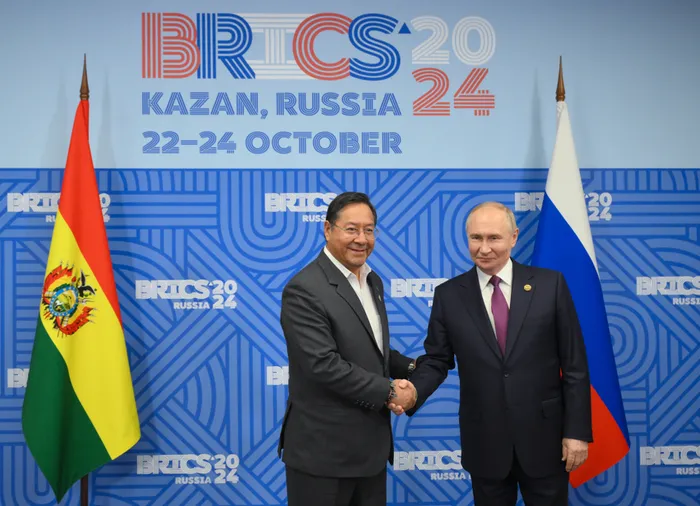BRICS+ Series: Lithium Powerhouse Bolivia in BRICS

President Luis Arce of Bolivia and President Vladimir Putin of Russia, 2024.
Image: Sputnik
Bolivia having been welcomed as a partner nation within the BRICS economic alliance, marks a major milestone in its foreign policy. President Luis Arce emphasises the strategic significance of the country’s integration into the bloc.
“Our Plurinational State of Bolivia has taken an essential step toward joining BRICS, following confirmation of approval from member states,” Arce shared via Telegram. He highlighted that this advancement would have broad economic and diplomatic benefits for Bolivia.
Russian President Vladimir Putin had previously revealed that BRICS leaders finalised a list of new partner countries during the summit in Kazan, Russia. The gathering, held from October 22 to 24, focused on expanding BRICS membership, reinforcing multilateral cooperation, and addressing regional challenges. The summit concluded with a joint declaration from the participating nations.
The Expanding Influence of BRICS
Established in 2006, BRICS has evolved into a prominent intergovernmental alliance comprising Brazil, Russia, India, China, and South Africa. In 2024, the bloc expanded to include Egypt, Ethiopia, Iran, the United Arab Emirates, and Saudi Arabia, although Saudi Arabia has yet to formalise its participation. Russia assumed the BRICS presidency at the start of 2024, overseeing the integration of new members and advancing initiatives for economic and geopolitical collaboration.
During a closed-door session of the Kazan summit, President Putin emphasised the growing influence of BRICS in global affairs. He described the alliance as a driving force in shaping a multipolar world and underscored its role in promoting economic stability and resolving regional disputes.
Putin also stressed the importance of expanding BRICS membership to reflect the aspirations of the broader international community. He noted that over 30 nations have expressed interest in joining, reinforcing the bloc’s appeal among countries in the Global South and East.
As part of Russia’s leadership within BRICS, Putin proposed establishing a BRICS “grain exchange” to ensure fair market conditions and safeguard national economies from external disruptions. The initiative aims to protect food security by preventing artificial shortages and market manipulation. With Bolivia’s inclusion and the growing interest from other nations, BRICS continues to strengthen its position as a key player in the evolving global economic landscape.
What does Bolivia bring to BRICS?
Bolivia has the largest salt flat on earth, lending itself to mineral extraction (like lithium), scientific research (even as a proxy for Mars during research). Bolivia is home to a myriad of resources. This could be seen by its top exports in the last quarter of November 2024 included zinc ores and concentrates ($136 million), natural gas ($113 million), precious metal ores ($109 million), tin and tin alloys ($48.6 million), and non-monetary gold ($28.6 million). Meanwhile, the most imported goods were gas oils ($137 million), motor spirit and other light fuels ($75.7 million), motor vehicles ($24.2 million), insecticides ($15.4 million), and various food preparations ($15.2 million). As a major natural gas exporter, Bolivia supports BRICS' energy diversification efforts, providing alternatives to Western energy markets. Its mineral wealth also bolsters the bloc’s manufacturing and infrastructure projects, aligning with BRICS' goal of economic self-sufficiency.
Bolivia is also part of what is called the Lithium Triangle (other nations being: Chile and Argentina). Despite being the lightest metal, lithium plays a massive role in today’s technologically driven world. It powers essential devices such as smartphones, laptops, and electric vehicles, making it a key component of modern batteries. With global lithium consumption rising by 8.9% per year, demand continues to surge as hybrid and electric vehicles, energy storage solutions, and portable electronics become more prevalent. While lithium reserves exist across all six inhabited continents, over 75% of the world’s supply is concentrated in the salt flats of Chile, Argentina, and Bolivia—known as the "Lithium Triangle."
What does BRICS bring to Bolivia?
BRICS provides Bolivia with direct trade links to some of the world's largest economies, including China, India, Brazil, and Russia. These include: (1) Diversified export markets for Bolivia’s key resources like lithium, natural gas, and minerals; (2) Reduced reliance on Western markets, creating a more balanced and stable trade portfolio; (3) Easier trade agreements within the BRICS framework, potentially lowering tariffs and boosting Bolivian exports.
The probability of securing funding for Bolivia through BRICS’ New Development Bank (NDB) increases considerably–providing Bolivia with funding for infrastructure, energy, and industrial projects. Increased foreign direct investment (FDI) from BRICS nations, particularly in lithium extraction (Noting China as the largest EV manufacturer in the world), energy production, and manufacturing. Potential access to joint ventures in sectors like renewable energy, transportation, and mining technologies.
Bolivia’s induction into the BRICS alliance marks a pivotal step in reshaping both its national development trajectory and the broader geopolitical landscape. As a nation rich in natural resources—particularly lithium, natural gas, and precious metals—Bolivia offers strategic value to BRICS, enhancing the bloc’s pursuit of economic diversification, energy security, and technological self-reliance. In return, Bolivia stands to benefit significantly from expanded trade networks, increased foreign investment, and greater access to developmental financing through institutions like the New Development Bank.
This partnership signals a broader shift toward a multipolar global order, where emerging economies assert greater influence in international affairs. Bolivia’s entry into BRICS is not only a win for its domestic economy but also a symbol of the bloc’s growing appeal and cohesion among Global South nations. As BRICS continues to evolve, Bolivia’s contributions—especially in the critical area of lithium—will be instrumental in powering the future of clean energy and sustainable development.
Written by:
*Dr Iqbal Survé
Past chairman of the BRICS Business Council and co-chairman of the BRICS Media Forum and the BRNN
*Cole Jackson
Lead Associate at BRICS+ Consulting Group
Chinese & South American Specialist
**The Views expressed do not necessarily reflect the views of Independent Media or IOL.